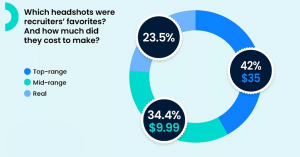A recent study by LLMA, Inc. has uncovered a surprising trend in the recruitment industry, highlighting a bias towards artificially generated profile pictures.
SAN FRANCISCO, CA, UNITED STATES, September 28, 2024 /EINPresswire.com/ -- A recent study by LLMA, Inc. has uncovered a surprising trend in the recruitment industry, highlighting an unconscious bias towards artificially generated profile pictures. The research, conducted in August 2024, involved over 3,000 hiring professionals and sheds light on the complex interplay between technology and human perception in the job market.
Key findings include:
Unintentional Preference: A staggering 76.5% of recruiters favored AI-generated headshots over authentic photographs when unaware of their origin.
Conscious Hesitation: Paradoxically, nearly 70% of the same recruiters expressed reservations about candidates who knowingly use AI-created images.
Overconfidence in Detection: While 80% of participants believed they could accurately identify AI-generated images, the average success rate was a mere 39.5%.
Quality Matters: High-end AI headshot generators produced images that were preferred 42% of the time, significantly outperforming both mid-range and free alternatives.
Headshot Importance: Three-quarters of recruiters reported being more likely to interview candidates who include headshots in their applications.
Ethical Considerations: 88% of recruiters believe candidates should disclose the use of AI-generated headshots, highlighting a strong preference for transparency.
Detection Challenges: Recruiters' ability to spot AI-generated images varied based on the quality of the generator, with free services being easier to detect (58.9% accuracy) compared to premium options (29.2% accuracy).
The study utilized a comprehensive approach to assess recruiter preferences and perceptions:
Diverse Image Set: Five hypothetical employees (two men and three women) were used as subjects for both real and AI-generated headshots.
AI Tools Spectrum: Four different AI headshot generators were employed, ranging from free services (A2E) to premium options, with mid-range solutions in between.
Blind Comparison: Recruiters were presented with a mix of real and AI-generated headshots without initial disclosure of their origin.
Self-Assessment: Participants were asked to evaluate their own ability to detect AI-generated images, revealing a significant gap between perceived and actual performance.
The study utilized a range of AI headshot generators, from free services to premium options, and compared them against professional photographs. Interestingly, recruiters struggled to distinguish between real and AI-generated images, with only a 64.3% success rate in identifying authentic headshots.
"These findings highlight a growing need for transparency and ethical considerations in the use of AI technology in recruitment processes", said Lewis Carhart, CEO of LLMA, Inc. (creators of a link building tool, LinkDR). "While AI-generated images may inadvertently create a positive first impression, candidates should be cautious about their use, given the strong preference for honesty among recruiters."
The study raises important questions about personal branding strategies in job applications, several implications for job seekers could include:
Quality Over Artificiality: High-quality, professional photographs remain the safest choice for job applicants.
Ethical Dilemma: While AI-generated headshots may provide an initial advantage, their use poses ethical questions and potential risks if discovered.
Disclosure Debate: The strong preference for transparency among recruiters suggests that honesty about AI use could be crucial, despite potential biases.
Lewis Carhart
LLMA, Inc.
email us here
Legal Disclaimer:
EIN Presswire provides this news content "as is" without warranty of any kind. We do not accept any responsibility or liability for the accuracy, content, images, videos, licenses, completeness, legality, or reliability of the information contained in this article. If you have any complaints or copyright issues related to this article, kindly contact the author above.



